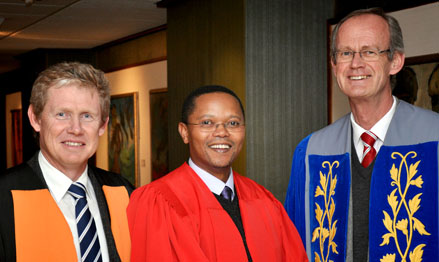Latest News Archive
Please select Category, Year, and then Month to display items
30 October 2018
|
Story Rulanzen Martin
|
Photo Peet van Aardt
 Some of the student writers who contributed to the anthology that tells their stories in Sesotho, isiXhosa, isiZulu, English and Afrikaans.
Some of the student writers who contributed to the anthology that tells their stories in Sesotho, isiXhosa, isiZulu, English and Afrikaans.
How do you transform the higher education curriculum? You involve the exact people the curriculum is intended for. The book, Initiative for Creative African Narratives (iCAN,) illustrates how decolonisation can be achieved through literature for students by students.
iCAN is an initiative by the Centre for Teaching and Learning (CTL) at the University of the Free State (UFS) to mentor students in creative and narrative writing. Under the mentorship of Dr Peet van Aardt, project coordinator, and Ace Moloi, author and UFS alumnus, iCAN Volume 1 was recently launched with 47 short stories written by UFS students.
“The project is a response from the centre for the ever-increasing need for decolonised curricula, steeped in the local cultural perspective of ubuntu,” said Dr Van Aardt.
“This book is an example for how decolonisation can be implemented,” said Prof Francois Stydrom, Senior Director of CTL. The overall aim of the iCAN project is to have the content that materialised from it to be included in the curriculum of first-year students at UFS in the near future.
Book provides multiple voices
Starting in May 2018, CTL presented a series of creative writing workshops on all three of the UFS campuses. “It’s a medium that allows a diverse range of students to express their views and develop their voices as writers,” said Prof Strydom.
It is a form of empowerment, to pass the baton to students to improve the UFS curriculum by writing and publishing their own stories, thereby contributing to larger bodies of knowledge through their lived experiences.
“I believe we as a university need to enable students so that they move away from just being users to becoming contributors to the curriculum,” Dr van Aardt concluded.
Inaugural lecture by Prof Kwandiwe Kondlo
2011-08-26
|

|
|
Present at the inaugural lecture of Prof Kwandiwe Kondlo were from the left: Prof. Lucius Botes, Dean of the Faculty of Humanities; Prof. Kwandiwe Kondlo and Prof. Teuns Verschoor, Vice-Rector: Institutional Affairs
Photo: Stephen Collett
|
Can the South African Communist Party (SACP) ever become a viable option for the ANC or has it become just a flat spare-tyre of the ruling party? Is there more to expect from the SACP or has it run full cycle? These are some of the questions that were brought up by Prof. Kwandiwe Kondlo at his inaugural lecture at our university on 24 August 2011.
Prof. Kondlo, head of our Centre for Africa Studies, told the audience that the current SACP (unlike pre-1994) is a party in which theory and intellectual reflection were being eclipsed by politics of pragmatism and warned that self-interest and ambition have become a problem. Delivering his lecture on the topic The South African Communist Party and the Dilemma of the National Democratic Revolution in South Africa, 1994 to date, Prof. Kondlo warned that he may ruffle feathers amongst those with ideological commitments and said that as an intellectual it was his job to irritate.
Prof. Kondlo told the audience his lecture would re-open old debates telling them that old questions are making way to the fore, for example the nationalisation debate.